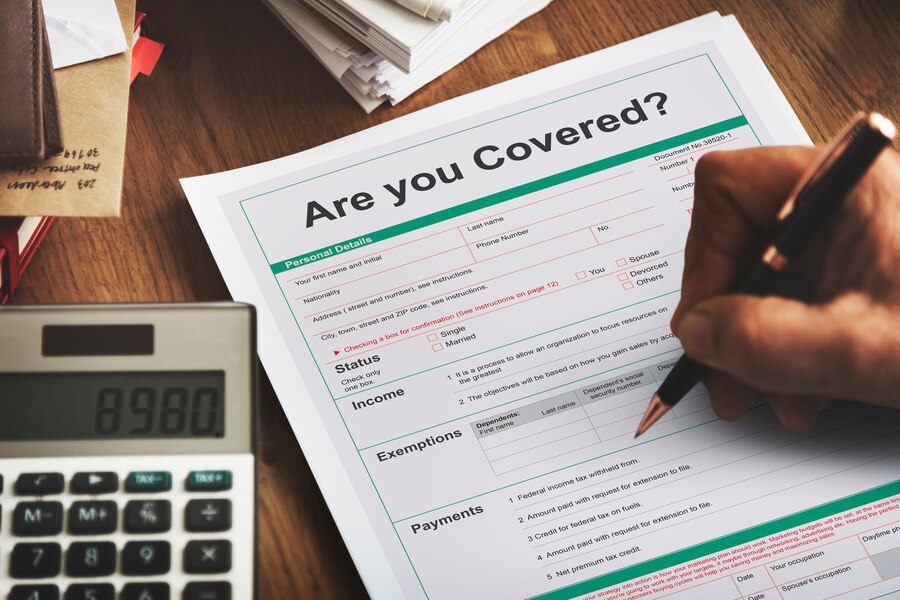Insurance
Homeowners Insurance: A Comprehensive Guide to Protecting Your Home

Homeowners insurance is central to the safeguard that protects the most significant investments—your home. It provides financial protection against various risks, including damage to your property, theft, and liability for injuries occurring on your premises. This article will assist you understand the basics of homeowners insurance, the various types of coverage available, and tips for finding the right policy to suit your needs.
Understanding Homeowners Insurance
Homeowners insurance is a policy that covers your home and possessions against damage or loss. It also provides liability coverage in case someone is injured on your property. A standard homeowners insurance policy typically includes several types of coverage:
- Dwelling Coverage: Covers the structure of your townhouse, including walls, roof, and built-in appliances, against risks like fire, wind, and hail.
- Other Structures Coverage: Protects structures on your property that aren’t attached to your residence, such as garages, sheds, and fences.
- Personal Property Coverage: Covers your personal belongings, such as furniture, electronics, and clothing, against risks like theft, fire, and vandalism.
- Liability Coverage: Provides protection if someone is injured on your property and you are therefore found legally responsible. It also covers legal fees and court costs.
- Additional Living Expenses (ALE): Pays for additional costs whenever you live elsewhere temporarily while your house is being repaired caused by a covered loss.
Types of Homeowners Insurance Policies
There are various types of homeowners insurance policies, each providing varying levels of coverage:
- HO-1 (Basic Form): Offers limited coverage for specific perils, such as fire, lightning, and theft. This type is rarely used due to its limited scope.
- HO-2 (Broad Form): Provides broader coverage than HO-1, covering additional perils like falling objects and water damage from plumbing issues.
- HO-3 (Special Form): The most typical type of homeowners insurance. It offers comprehensive coverage for your home against all perils, except those specifically excluded in the policy.
- HO-4 (Renter’s Insurance): Designed for renters, this policy covers personal property and liability but does not cover the structure itself.
- HO-5 (Comprehensive Form): Provides the most extensive coverage for both your home and personal belongings against all perils, except those explicitly excluded.
- HO-6 (Condo Insurance): For condominium owners, this policy covers personal property, liability, and sometimes structural improvements within the unit.
- HO-8 (Modified Coverage Form): Designed for older homes, this policy provides coverage good home’s actual cash value rather than replacement cost.check site
Factors Affecting Homeowners Insurance Rates

Several factors influence the price of homeowners insurance premiums:
- Location: Homes in areas prone to natural disasters, crime, or high repair costs typically have higher premiums.
- Home Value and Rebuilding Cost: The higher the value of your townhouse and the cost to rebuild it, the higher your premium will be.
- Age and Condition of the Home: Older homes or those in poor condition may cost more to insure.
- Coverage Amounts: Higher coverage limits and lower deductibles increase premiums.
- Credit Score: Insurers often use credit scores to assess risk, with higher scores leading to lower premiums.
- Claims History: A medical history of frequent claims can lead to higher premiums.
Tips for Finding the Best Homeowners Insurance Policy
- Assess Your Coverage Needs
- Determine how much coverage you need for your dwelling, personal property, and liability. Consider factors like the cost to rebuild your home, the value of your belongings, and potential liability risks.
- Compare Quotes
- Obtain quotes from multiple insurers to compare prices and coverage options. Use online comparison tools or work with an insurance broker to streamline the process.
- Consider Bundling Policies
- Many insurers offer discounts if you bundle multiple policies, such as home and auto insurance, with your company.
- Look for Discounts
- Inquire about available discounts, such as for installing security systems, having a claims-free history, or being a member of certain organizations.
- Review the Policy Exclusions
- Understand what is excluded from your policy. Common exclusions include flood and earthquake damage, which may require separate policies.
- Check the Financial Strength of the Insurer
- Choose an insurance company with strong financial ratings from agencies like A.M. Best, Moody’s, or Standard & Poor’s to ensure their ability to pay out claims.
- Read Customer Reviews
- Research customer reviews and ratings to gauge the insurer’s reputation for customer service and claims handling.
- Regularly Review and Update Your Policy
- Your insurance needs may change over time. Review your policy annually and update your coverage as necessary, especially after significant life events like home renovations or major purchases.
Recommended Homeowners Insurance Companies
Here are a couple highly regarded homeowners insurance companies recognized for their comprehensive coverage and customer service:
- State Farm
- Known for its extensive agent network and excellent customer service, State Farm offers many coverage options and discounts.
- Allstate
- Allstate provides customizable policies and numerous discounts, including for bundling and having protective devices in your home.
- Liberty Mutual
- Liberty Mutual offers many different coverage options and discounts, such as for new homes, paperless billing, and claims-free history.
- USAA
- USAA is a top choice for military members and their families, known for its excellent customer service and competitive rates.
- Farmers
- Farmers offers customizable coverage options and discounts for features like home safety devices and energy-efficient homes.
Conclusion
Homeowners insurance is an important investment in protecting your home and personal property. By understanding the various types of coverage, assessing your needs, and comparing quotes, one can find a policy that provides the protection you need at a price you can afford. Regularly reviewing your policy ensures it continues to meet your needs as circumstances change, giving you relief and financial security.home
Insurance
Auto Insurance Quotes: How to Find the Best Rates and Coverage

Auto insurance is a necessary expense for vehicle owners, providing financial protection against accidents, theft, and other incidents. With numerous options available, finding the right auto insurance quotes can be challenging. This document will guide you through the entire obtaining auto insurance quotes, understanding the factors that affect rates, and tips for securing the best coverage at the most cost effective price.
Understanding Auto Insurance
Auto insurance is a contract between you and an insurance company that covers financial losses resulting from accidents or theft. The key components of auto insurance policies include:
- Liability Coverage: Covers damages and injuries you cause to others in an accident.
- Collision Coverage: Pays for damage to your car resulting from a collision with another vehicle or object.
- Comprehensive Coverage: Covers non-collision-related damage to your car, such as theft, vandalism, or natural disasters.
- Personal Injury Protection (PIP): Covers medical expenses for everyone passengers, regardless of who is at fault.
- Uninsured/Underinsured Motorist Coverage: Protects you if you’re hit by a driver without adequate insurance.
How to Get Auto Insurance Quotes
Obtaining auto insurance quotes involves several steps to ensure you get the very best rates and coverage:
1. Gather Necessary Information
- Have details about your vehicle, such as make, model, year, and VIN.
- Anticipate to provide personal information, including your driver’s license number, address, and driving history.
- If you’re adding other drivers to the policy, gather their information as well.click here
2. Use Online Comparison Tools
- Utilize online comparison websites to get quotes from multiple insurers quickly. Websites like Geico, Progressive, and State Farm let you compare rates easily.
3. Contact Insurance Companies Directly
- Visit insurance company websites or call their customer service lines to get quotes. This can sometimes result in more personalized rates and discounts.
4. Consult an Insurance Agent or Broker
- An insurance agent or broker can assist you navigate the complexities of auto insurance and provide quotes from various insurers.
Factors Affecting Auto Insurance Rates
Several factors influence auto insurance premiums:
- Driving Record: A clean driving record with no accidents or violations typically results in lower premiums.
- Age and Gender: Younger drivers and male drivers often face higher rates due to higher risk profiles.
- Location: Rates vary by location, with urban areas generally having higher premiums due to higher accident and theft rates.
- Vehicle Type: The make, model, and year of your car affect the price tag on insurance. High-performance or luxury vehicles typically cost more to insure.
- Coverage Levels: Higher coverage limits and lower deductibles increase premiums.
- Credit Score: Many insurers use credit scores to assess risk, with higher scores leading to lower premiums.
- Mileage: Lower annual mileage can bring about lower premiums as less driving reduces the likelihood of accidents.
Tips for Finding the Best Auto Insurance Quotes

- Compare Multiple Quotes
- Always compare quotes from several insurers to get the best rates and coverage options. Rates can vary significantly between companies.
- Consider Your Coverage Needs
- Determine the condition of coverage you need based on your vehicle’s value, your financial situation, and your risk tolerance. Don’t pay for unnecessary coverage.visit
- Take Advantage of Discounts
- Look for discounts such as multi-car, good driver, good student, low mileage, and safety feature discounts. Ask each insurer about all available discounts.
- Bundle Policies
- Many insurers offer discounts if you bundle multiple policies, such as auto and home insurance, with company.
- Maintain a Good Driving Record
- Avoid accidents and traffic violations to keep your premiums low. Some insurers offer accident forgiveness programs for long-term customers.
- Consider a Higher Deductible
- Opting for a higher deductible can lower your premium. Just ensure you really can afford the deductible amount any time of a claim.
- Improve Your Credit Score
- A higher credit score could lead to lower premiums. Pay bills on time and reduce debt to improve your credit score.
- Review Your Policy Annually
- Your insurance needs may change over time. Review your policy annually and compare new quotes to ensure you’re still getting the best rate.go
Recommended Auto Insurance Companies
Areas top-rated auto insurance companies recognized for their competitive rates and excellent customer service:
- Geico
- Geico enjoys its affordable rates and numerous discounts, including good driver, military, and multi-policy discounts.
- State Farm
- State Farm offers quite a few coverage options and discounts, such as good student and multi-car discounts, and then a strong network of local agents.
- Progressive
- Progressive provides competitive rates and innovative tools like the Name Your Price tool, which helps you find coverage within your budget.
- Allstate
- Allstate offers customizable policies and various discounts, including safe driver and new car discounts, and then a solid reputation for customer service.
- USAA
- USAA provides affordable insurance options for military members and their families, with excellent customer service and a variety of discounts.
Conclusion
Finding the right auto insurance quotes involves understanding your coverage needs, gathering the necessary information, and comparing multiple quotes. By considering factors like your driving record, vehicle type, and available discounts, you can secure affordable and comprehensive coverage. Regularly reviewing your policy ensures it continues to meet your needs, providing financial protection and assurance on the road.home
Insurance
Cheap Car Insurance: Tips and Tricks for Affordable Coverage
Insurance
Life Insurance Policy: Understanding the Essentials and Finding the Best Coverage

Life insurance is a critical component of financial planning, providing a safety net for your loved ones in the eventuality of your untimely death. It can benefit cover expenses like funeral costs, outstanding debts, and living expenses, ensuring your family’s financial stability. Piece of content guide you through the basics of life insurance policies, types of coverage available, and tips for finding the best policy to meet your needs.
Understanding Life Insurance
Life insurance is a contract between you and an insurance company. In exchange for premium payments, the insurer provides a death benefit to your beneficiaries upon your death. The primary purpose of life insurance is to provide financial protection to your dependents.
Key Terms to Know
- Policyholder: The one who owns the life insurance policy.
- Insured: The person whose life is taught in policy.
- Beneficiary: The person or entity who receives the death benefit.
- Death Benefit: How much money paid to the beneficiary upon the insured’s death.
- Premium: The payment made to the insurance company for the coverage.
- Term: The period during which the policy is in effect.
Types of Life Insurance Policies

1. Term Life Insurance
Term life insurance provides coverage for a specific period, typically 10, 20, or 30 years. If the insured dies during the term, the death benefit is paid to the beneficiaries. Term life insurance is generally more affordable than permanent life insurance.
Pros:
- Lower premiums
- Simple and straightforward
- Fixed premiums for the term
Cons:
- No cash value accumulation
- Coverage ends when the term expires
2. Whole Life Insurance
Whole life insurance provides coverage for the insured’s entire life, provided premiums are paid. It also includes a savings component, known as cash value, which grows over time.
Pros:
- Lifetime coverage
- Cash value accumulation
- Fixed premiums
Cons:
- Higher premiums than term life insurance
- Complexity of cash value component
3. Universal Life Insurance
Universal life insurance is a permanent life insurance with flexible premiums and a cash value component. Policyholders can adjust their premium payments and death benefit amounts, within certain limits.click here
Pros:
- Flexibility in premiums and death benefits
- Lifetime coverage
- Cash value accumulation with potential for higher returns
Cons:
- Can be more expensive than term life insurance
- Requires active management and understanding of policy mechanics
4. Variable Life Insurance
Variable life insurance is another sort of permanent life insurance that allows policyholders to invest the cash value in various investment options, such as stocks and bonds. The death benefit and cash value can fluctuate based on investment performance.
Pros:
- Potential for higher returns on cash value
- Lifetime coverage
- Investment control
Cons:
- Higher risk due to market fluctuations
- Higher premiums and fees
- Complexity of investment options
Factors to Consider When Choosing a Life Insurance Policy
1. Coverage Amount
Determine how much coverage you need based on your financial obligations, such as mortgage payments, education expenses, and income replacement. A common guideline : is to have coverage that is 5-10 times your annual income.
2. Policy Term
For term life insurance, choose a term that aligns with your financial responsibilities. For example, when you have young children, a 20-year term might cover their education expenses and provide for them until they are financially independent.
3. Premiums
Consider your budget and ensure you really can afford the premiums over the long term. Permanent policies have higher premiums but offer additional benefits like cash value accumulation.
4. Health and Age
Your age and health significantly impact your premium rates. Generally, the younger and healthier you are, the lower your premiums will be. Some policies may require a medical exam.
5. Financial Strength of the Insurer
Choose an insurance company with strong financial ratings from agencies like A.M. Best, Moody’s, or Standard & Poor’s. This ensures the company’s ability to pay out claims.
6. Riders and Add-Ons
Consider any additional riders or add-ons that will be beneficial, such as accidental death benefit, waiver of premium, or critical illness coverage. These can provide extra protection and flexibility.
Tips for Finding the Best Life Insurance Policy
- Assess Your Needs
- Evaluate your financial responsibilities and goals to discover the appropriate coverage amount and policy type.
- Shop Around
- Get quotes from multiple insurers to compare premiums and coverage options. Online comparison tools can simplify this process.
- Read the Fine Print
- Understand the policy details, including exclusions, limitations, and any fees linked to the cash value component of permanent policies.
- Work with a Financial Advisor
- A financial advisor could help you navigate the complexities of life insurance and choose a policy that aligns with your overall financial plan.
- Review Your Policy Regularly
- Life changes such as marriage, having children, or buying a home may require adjustments to your coverage. Review your policy periodically to ensure it still meets your needs.
Conclusion
Ought to be life insurance plan is a crucial step in securing your family’s financial future. By understanding the different kinds of life insurance, evaluating your needs, and comparing quotes, one can find a policy that provides the protection and reassurance you seek. Remember, the best life insurance plan is one that offers the right balance of coverage, affordability, and benefits tailored to your unique situation.Home
-

 Business2 months ago
Business2 months agoNippyFiles: The Complete Guide to Downloading and Sharing Files
-

 Celebrity7 months ago
Celebrity7 months agoSean Kaufman Ethnicity, Wiki, Age, Career And More
-

 Sports2 months ago
Sports2 months agoArcenturf Gagnant: Your Ultimate Guide to Smart Turf Betting
-

 Tech3 months ago
Tech3 months agoWhat is Proxiyum? A Complete Guide to Web Proxy Services
-

 entertainment2 months ago
entertainment2 months agoHD Hub 4u: Your Ultimate Guide to Free Movie Downloads
-

 Celebrity7 months ago
Celebrity7 months agoJack Champion Height, Biography, Wiki, Age, Career And More
-

 Celebrity7 months ago
Celebrity7 months agoDerek Lipp Wealth: What Is His Net Worth in 2023?
-

 Celebrity7 months ago
Celebrity7 months agoWho Is Jennifer Hermoso Partner? Bio, Wiki, Age, Career, Net Worth And More



